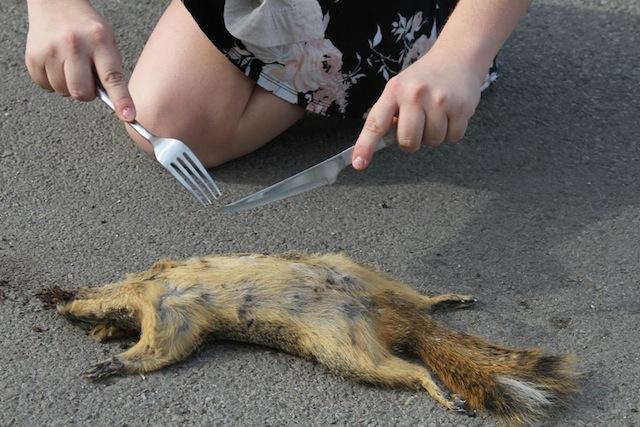
What’s for dinner in Texas? Road kill, if it were up to Tink Nathan. Nathan, a republican and founder of Tink’s Deer Scent Company, recently ran for state representative in district 53 in Texas.
Nathan, of Centerpoint, lost the primary election on March 4 to Rob Henneke and Andrew Murr, who are now in a runoff, but his campaign raised the question: should Texas revisit its road kill law?
The human consumption of road kill is actually legal in most states, the most recent convert being Montana. Texas is one of just three states that doesn’t allow any collection of road kill. The other states are Washington and California.
Nathan’s campaign platform promised that, if elected, he would make reforms to the Texas wildlife code and allow Texans to consume road kill.
Many states have restrictions on the types of animals that can be collected or require permits to pick up the dead animals. In Alaska, New York, Florida and others any road kill carcasses can be collected for personal use or for food charities.
Montana State Representative Steve Lavin, a highway-patrolman and the man responsible for that states pro-road kill bill, says, “All we did was legalize something that’s been going on for years and years.”
The Montana bill that passed in 2013 requires that the person who wishes to eat the road kill obtain a free permit from a state peace officer within 24 hours of finding the carcass.
America has a long history with road kill, especially in states where deer collisions are common. In Pennsylvania, where the numbers on deer vs. car collisions are the highest in the country, the damages can be expensive.
With each damage claim averaging over $3,400 and almost 115,000 collisions occurring in 2012-2013, according to State Farm, that’s almost $400 million in damages. But if people were harvesting the deer that caused that damage, that’s an astounding 8,600,000 pounds of meat.
Lavin has found that such road kill can serve a much better purpose than being left to rot on the side of the road, or being sent to a landfill. He once found a fresh elk on the road and sent it to a soup kitchen.
“The food banks will use it to feed needy families,” says Lavin. He also recalls hearing from fellow Montanans that this new source of free meat has been vital to being able to feed their families on a tight budget.
But with Texas lacking in the big game animals like elk, moose and bear that are common road kill in Montana, what exactly would you be finding were road kill legal to eat here?
iNaturalist runs a citizen scientist project that allows average people to upload photos of road kill they find and document the area to contribute a more broad array of data to the research project ASC Road kill Observations. Recent observations across the state of Texas include a greater roadrunner, a coyote, several crawfish frogs, a cottontail rabbit and a raccoon, none of which are great options when searching for a free roadside meal.
While rabbit and frogs legs are a popular treat for some, this type of game is too small to be considered edible once it has been squashed by a car.
“I’ve been driving across Texas for years,” says SMU professor Ben Wallace, “and I have never seen a deer on the side of the road.”
So is a change in the law really worth it in Texas?
“Eating road kill seems like it would only appeal to very few Texans,” says Jessica Gardner, an English major at SMU. “I personally would not participate in eating road kill, but to each his own, I guess.”
Gardner’s attitude seems to be the norm on the SMU campus, where students cringe at the mere mention of squirrel stew. Still, the pro-road kill community continues finding new ways of roasting, frying or grilling their free meat.
Road kill recipes can be found at www.deadfood.com where the website not only caters to Americans looking for a new and exciting way to cook skunk, but to people all over the world who are simply wondering, what can I do with that wallaby?
On deadfood.com you can find recipes for things like sweet pickled beaver, French fried skunk, or even squirrel potpie.
Most people bold enough to add road kill to their menus have done their research and have experience with butchering animals. This eliminates the health concerns some may have with eating road kill.
“It’s pretty easy to tell if the meat is good,” says Lavin. “The people utilizing this law have experience hunting.”
Even PETA has made statements of support for people eating road kill, calling it “The meat without murder.”
“If people must eat animal carcasses,” says the PETA website, “Road kill is a superior option to the neatly shrink-wrapped plastic packages of meat in the supermarket.”
But what makes some nature enthusiasts in Texas wary is the idea that passing such a law could lead to people using their cars to hunt.Kathy Rogers of Rogers Wildlife Rehabilitation Center in Hutchins, Texas is certain that this is the kind of behavior that would result. She’s seen it happen.
“When I’ve asked volunteers to find squirrels that my raptors would eat there are over exuberant ones that would actually go out and hit them on purpose,” says Rogers. “Needless to say they are no longer associated with our organization.”








